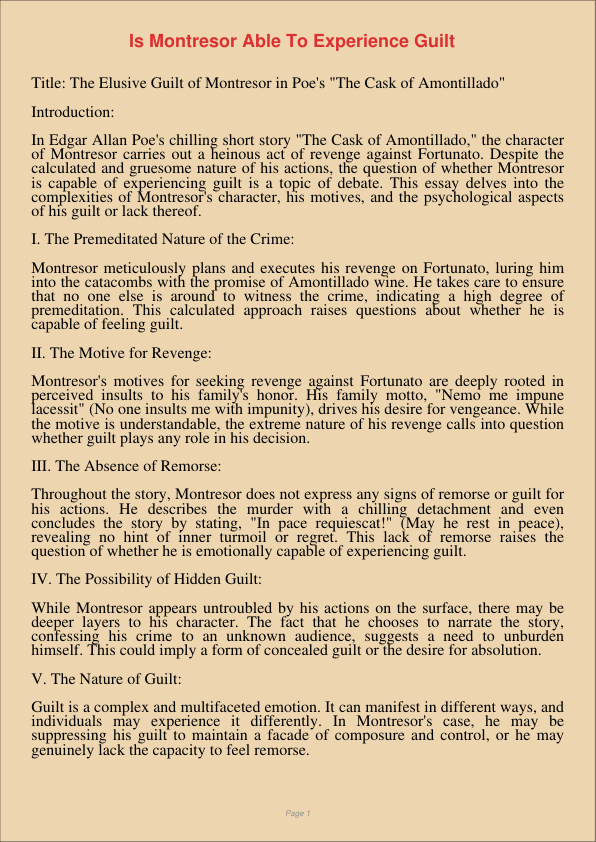Title: The Elusive Guilt of Montresor in Poe’s “The Cask of Amontillado”
Introduction:
In Edgar Allan Poe’s chilling short story “The Cask of Amontillado,” the character of Montresor carries out a heinous act of revenge against Fortunato. Despite the calculated and gruesome nature of his actions, the question of whether Montresor is capable of experiencing guilt is a topic of debate. This essay delves into the complexities of Montresor’s character, his motives, and the psychological aspects of his guilt or lack thereof.
I. The Premeditated Nature of the Crime:
Montresor meticulously plans and executes his revenge on Fortunato, luring him into the catacombs with the promise of Amontillado wine. He takes care to ensure that no one else is around to witness the crime, indicating a high degree of premeditation. This calculated approach raises questions about whether he is capable of feeling guilt.
II. The Motive for Revenge:
Montresor’s motives for seeking revenge against Fortunato are deeply rooted in perceived insults to his family’s honor. His family motto, “Nemo me impune lacessit” (No one insults me with impunity), drives his desire for vengeance. While the motive is understandable, the extreme nature of his revenge calls into question whether guilt plays any role in his decision.
III. The Absence of Remorse:
Throughout the story, Montresor does not express any signs of remorse or guilt for his actions. He describes the murder with a chilling detachment and even concludes the story by stating, “In pace requiescat!” (May he rest in peace), revealing no hint of inner turmoil or regret. This lack of remorse raises the question of whether he is emotionally capable of experiencing guilt.
IV. The Possibility of Hidden Guilt:
While Montresor appears untroubled by his actions on the surface, there may be deeper layers to his character. The fact that he chooses to narrate the story, confessing his crime to an unknown audience, suggests a need to unburden himself. This could imply a form of concealed guilt or the desire for absolution.
V. The Nature of Guilt:
Guilt is a complex and multifaceted emotion. It can manifest in different ways, and individuals may experience it differently. In Montresor’s case, he may be suppressing his guilt to maintain a facade of composure and control, or he may genuinely lack the capacity to feel remorse.
Conclusion:
The character of Montresor in “The Cask of Amontillado” is a fascinating study in the complexities of human psychology. His meticulous planning, lack of outward remorse, and the calculated nature of his revenge raise doubts about his capacity to experience guilt in the conventional sense. However, the act of narrating his crime, the need for confession, and the possibility of suppressed guilt suggest that the issue is not entirely straightforward. Whether Montresor is truly guilt-free or harbors hidden guilt remains a matter of interpretation, making him a character open to diverse readings and discussions.

「真诚赞赏,手留余香」
真诚赞赏,手留余香
使用微信扫描二维码完成支付
